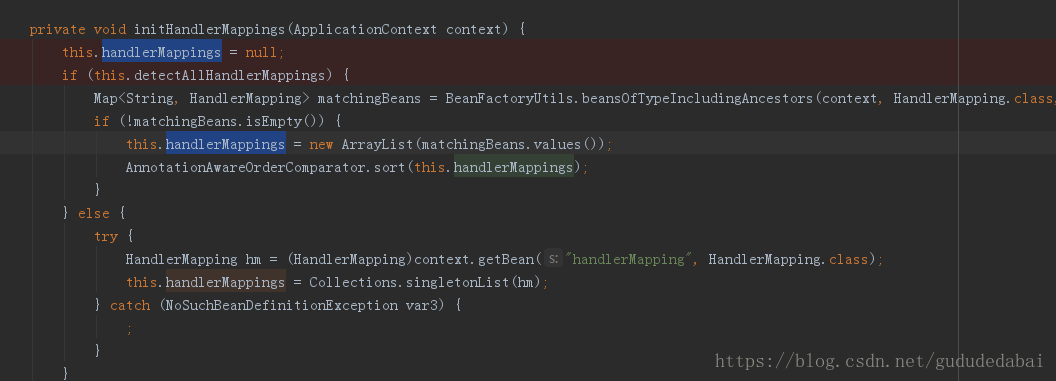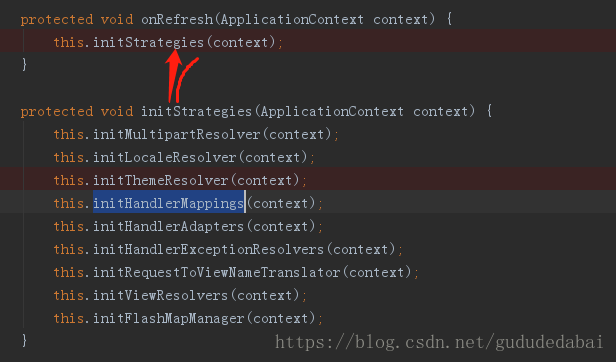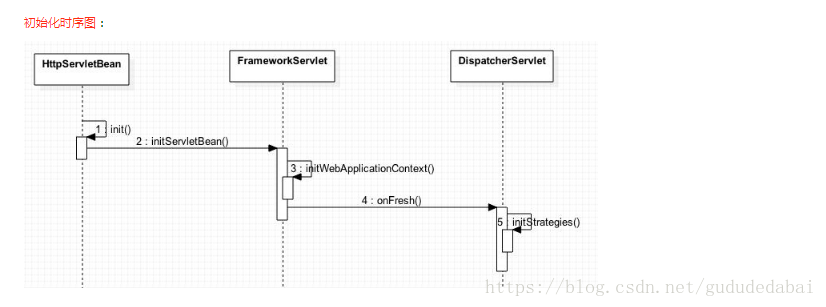由上一篇 springMVC核心代码(一)中最后一个问题,spring mvc 提供的控制器类型handlerMappings 是如何被初始化的,来引出SpringMVC初始化。那么先看HandlerMappings初始化源码可得:

其初始化是在DispatcherServlet类中的这个方法进行的,而这个初始化方法initHandlerMappings()又是什么时候执行的呢?在该类中发现,是在下面方法中执行初始化的,同时发现好多组件都是在这个方法中执行,比如另一个重要的对象控制器适配器

那么归根究底,其sprinngMVC的初始化是在onRefresh()这个方法中执行的。
因此下面首先通过时序图来探索springMVC的初始化流程:

servlet初始化会调用 init 方法,换句话说就是springMVC进行初始化的时候首先会去执行HttpServletBean的init方法, 下面看看HttpServletBean的源码:
public final void init() throws ServletException { if (this.logger.isDebugEnabled()) { this.logger.debug("Initializing servlet '" + this.getServletName() + "'"); } //从init参数设置bean属性 PropertyValues pvs = new HttpServletBean.ServletConfigPropertyValues(this.getServletConfig(), this.requiredProperties); if (!pvs.isEmpty()) { try { BeanWrapper bw = PropertyAccessorFactory.forBeanPropertyAccess(this); ResourceLoader resourceLoader = new ServletContextResourceLoader(this.getServletContext()); bw.registerCustomEditor(Resource.class, new ResourceEditor(resourceLoader, this.getEnvironment())); this.initBeanWrapper(bw); bw.setPropertyValues(pvs, true); } catch (BeansException var4) { if (this.logger.isErrorEnabled()) { this.logger.error("Failed to set bean properties on servlet '" + this.getServletName() + "'", var4); } throw var4; } } //让子类做任何他们喜欢的初始化 this.initServletBean(); if (this.logger.isDebugEnabled()) { this.logger.debug("Servlet '" + this.getServletName() + "' configured successfully"); } }
上面这段代码主要是在获取你在web.xml中配置在<init-param>中的属性(例如: namespace, contextConfigLocation)。 其中有一点值得注意,那就是 initServletBean() 这个方法是由其子类 FrameworkServlet 实现,因此, 接下来 FramworkServlet 会执行 initServletBean 这个方法,下面就继续看看 initServletBean 方法源码:
protected final void initServletBean() throws ServletException { this.getServletContext().log("Initializing Spring FrameworkServlet '" + this.getServletName() + "'"); if (this.logger.isInfoEnabled()) { this.logger.info("FrameworkServlet '" + this.getServletName() + "': initialization started"); } long startTime = System.currentTimeMillis(); try { this.webApplicationContext = this.initWebApplicationContext(); this.initFrameworkServlet(); } catch (RuntimeException | ServletException var5) { this.logger.error("Context initialization failed", var5); throw var5; } if (this.logger.isInfoEnabled()) { long elapsedTime = System.currentTimeMillis() - startTime; this.logger.info("FrameworkServlet '" + this.getServletName() + "': initialization completed in " + elapsedTime + " ms"); } }
可以看到 initServletBean 方法中就调用了一个 initFrameworkServlet 方法和 initWebApplicationContext 方法,其中initFrameworkServlet方法是由子类实现,这个不多说,直接看 initWebApplicationContext 方法源码:
protected WebApplicationContext initWebApplicationContext() { //此处的 rootContext 在你配置了ContextLoaderListener的时候注入的 //通过分析ContextLoaderListenr的源码,可以看到 //ContextLoaderListener通过ContextLoader根据ApplicationContext.xml的配置会创建一个xmlWebApplicationContext //如果没有配置ContextLoaderListener,本处将为null,但不影响springMVC,为何?通过接下来的分析,就能看到原因 WebApplicationContext rootContext = WebApplicationContextUtils.getWebApplicationContext(this.getServletContext()); WebApplicationContext wac = null; //当webApplicationContext已经存在,那么就直接使用,使用之前会先设置rootContext,为其跟。 //配置完成之后refresh一次,refresh会涉及到IOC的内容,本处不做探讨。 if (this.webApplicationContext != null) { wac = this.webApplicationContext; if (wac instanceof ConfigurableWebApplicationContext) { ConfigurableWebApplicationContext cwac = (ConfigurableWebApplicationContext)wac; if (!cwac.isActive()) { if (cwac.getParent() == null) { cwac.setParent(rootContext); } this.configureAndRefreshWebApplicationContext(cwac); } } } //如果不存在webApplicationContext,那么先去ServletContext中查找 if (wac == null) { wac = this.findWebApplicationContext(); } //如果上述没有查到,那么就创建webApplicationContext if (wac == null) { wac = this.createWebApplicationContext(rootContext); } if (!this.refreshEventReceived) { //此方法由DispatcherServlet调用 this.onRefresh(wac); } //将webApplicationContext保存在ServletContext if (this.publishContext) { //将上下文发布为servlet上下文属性。 String attrName = this.getServletContextAttributeName(); this.getServletContext().setAttribute(attrName, wac); if (this.logger.isDebugEnabled()) { this.logger.debug("Published WebApplicationContext of servlet '" + this.getServletName() + "' as ServletContext attribute with name [" + attrName + "]"); } } return wac; }
上面代码调用了一次 createWebApplicationContext 方法, 下面就看看这个方法的源码:
protected WebApplicationContext createWebApplicationContext(@Nullable ApplicationContext parent) { //此处的contextClass 可在web.xml 中的《init-param》中指定 //如果没有配置,那么默认的是XmlWebApplicationContext.class Class<?> contextClass = this.getContextClass(); if (this.logger.isDebugEnabled()) { this.logger.debug("Servlet with name '" + this.getServletName() + "' will try to create custom WebApplicationContext context of class '" + contextClass.getName() + "', using parent context [" + parent + "]"); } if (!ConfigurableWebApplicationContext.class.isAssignableFrom(contextClass)) { throw new ApplicationContextException("Fatal initialization error in servlet with name '" + this.getServletName() + "': custom WebApplicationContext class [" + contextClass.getName() + "] is not of type ConfigurableWebApplicationContext"); } else { //此处利用反射创建 ConfigurableWebApplicationContext wac = (ConfigurableWebApplicationContext)BeanUtils.instantiateClass(contextClass); wac.setEnvironment(this.getEnvironment()); wac.setParent(parent); String configLocation = this.getContextConfigLocation(); if (configLocation != null) { wac.setConfigLocation(configLocation); } //refresh一次,这里不多说 this.configureAndRefreshWebApplicationContext(wac); return wac; } }
以上就是创建webApplicationContext的代码,注释已给出。
还记得FrameworkServlet初始化的时候会调用onRefresh()方法吗,这个方法是留给其子类DispatcherServlet调用的, 最后就该看看DispatcherServlet里面的 onRefresh 方法了:
protected void onRefresh(ApplicationContext context) { this.initStrategies(context); } //初始化此servlet使用的策略对象。 //可以在子类中重写以初始化其他策略对象 protected void initStrategies(ApplicationContext context) { this.initMultipartResolver(context); this.initLocaleResolver(context); this.initThemeResolver(context); this.initHandlerMappings(context); this.initHandlerAdapters(context); this.initHandlerExceptionResolvers(context); this.initRequestToViewNameTranslator(context); this.initViewResolvers(context); this.initFlashMapManager(context); }
可以看到onRefresh方法就一句话,调用initStrategies方法, 上面给出了 initStrategies 源码, 很直观,就是在初始化springMVC 的一系列组件, 但是此处你要明白,SpringMVC的组件其实已经在webApplicationContext创建时就已经实例化了, 此处所谓的初始化只是在选择合适的组件(每一个组件都对应了几个不同的实现)。
到此,就可以很清楚知道,HandlerMappings和HandlerAdapter等是在什么时候初始化的。
原文链接:https://blog.csdn.net/gududedabai/article/details/83375156